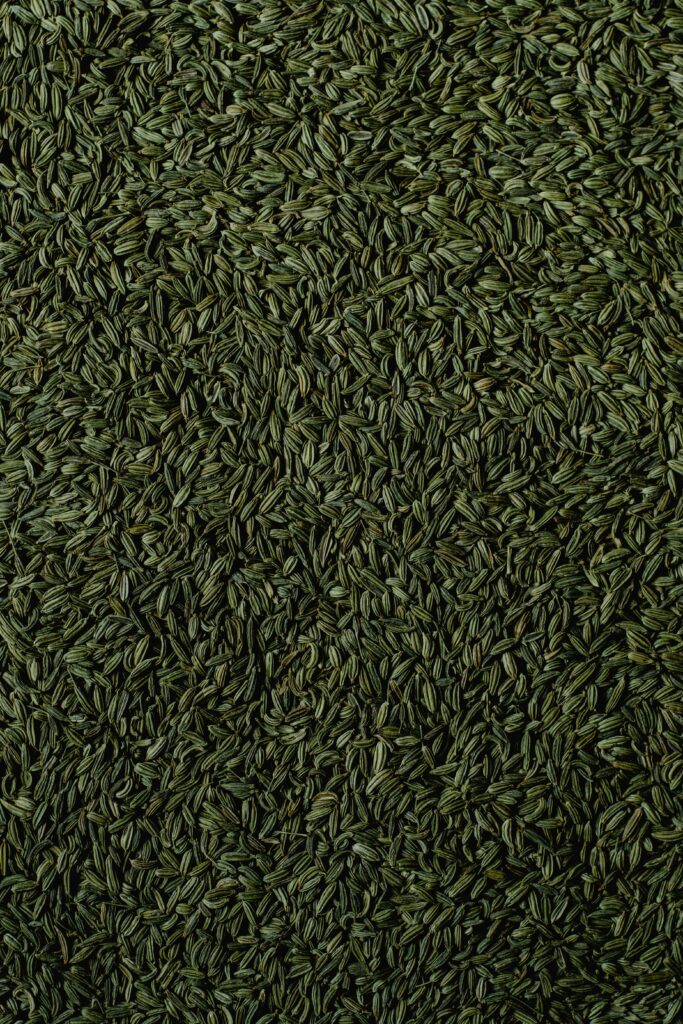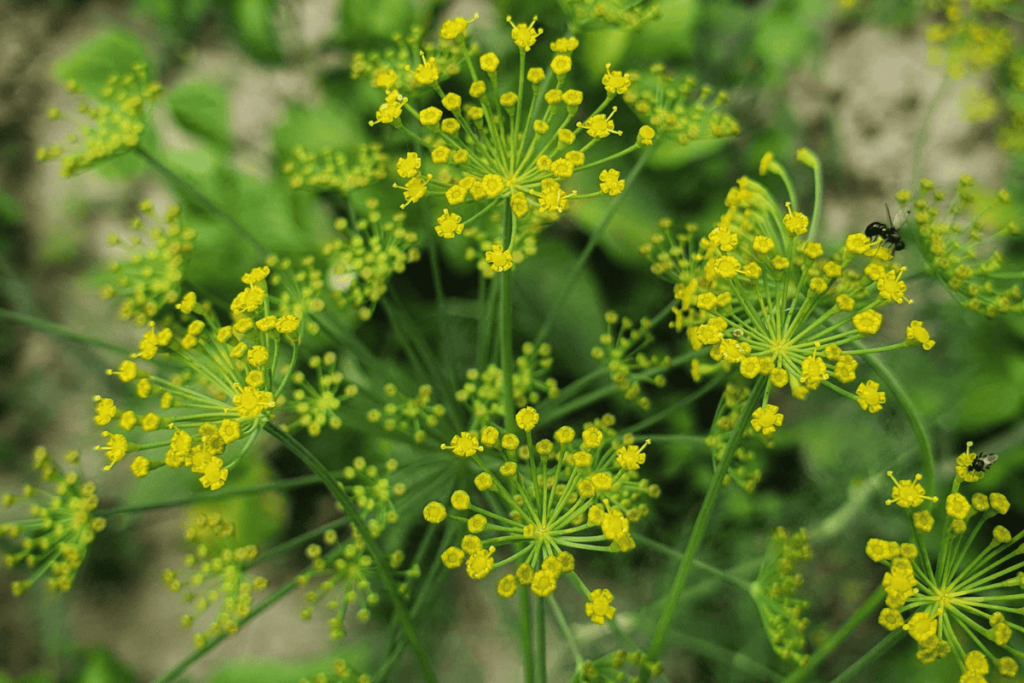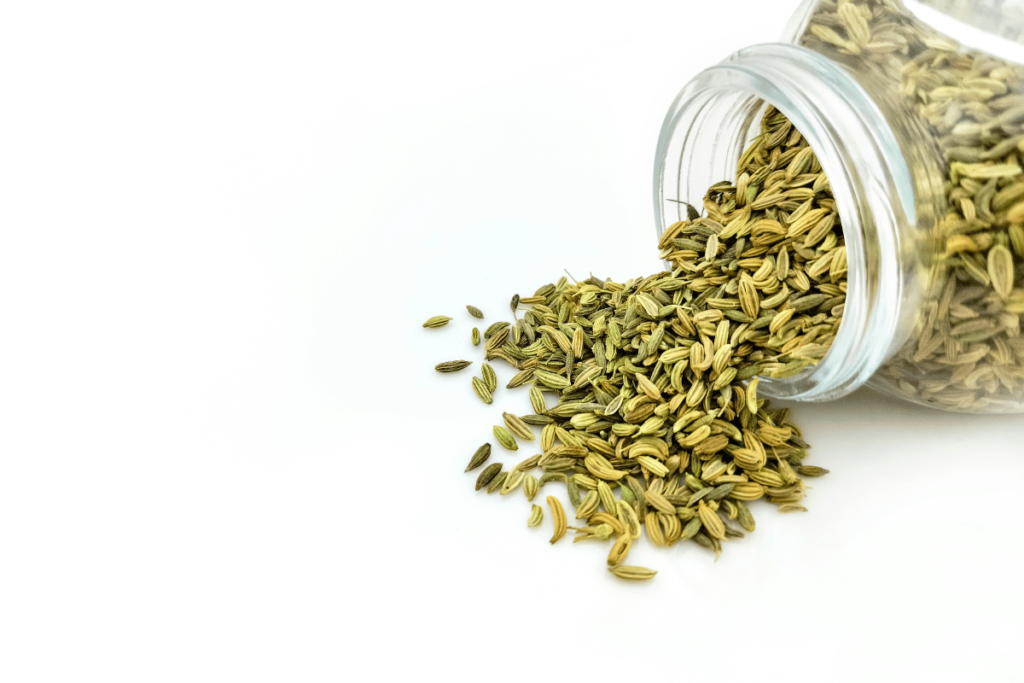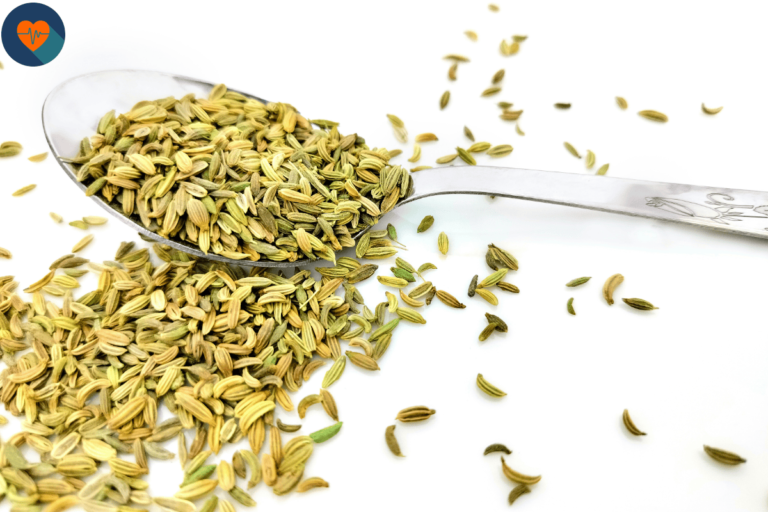I love cooking at home and am always looking out for unique flavors. Fennel seeds, with their exquisite, licorice-like smell, are one of my most favorite. They add a special touch to my dishes and are good for my health. The paper now proceeds with the unique world of fennel seeds and sees in what ways they improve our health and cooking.

They not only help in digestion, but they keep our hearts healthy too. They even have anti-inflammatory effects. Fennel seeds can be used on roasted vegetables or as a refreshing brew. Today, we will see how fennel seeds can contribute to making food and life better.
Table of Contents
Introducing Fennel Seeds: Origin and Botany
Fennel is a Mediterranean plant belonging to the Apiaceae family. It has been used as medication and in cooking for many centuries. This plant has green and white leaves, yellow flowers, and seeds that have a sweet, licorice taste.
Distinguishing Between Fennel, Anise, and Star Anise
Fennel and anise are mostly confused as one type of plant, but they are different. Fennel has a more significant aroma of licorice, being highly composed of anethole. This gives it its peculiar taste.
Traditional Uses Throughout History
Fennel has been used in many cultures for ages. It’s been used for health and in cooking. Fennel seeds are especially valued for their smell and health benefits.
Plant Characteristics and Growth
Fennel plants are smaller than wild ones. The “finocchio” variety is popular for its mild taste. India grows the most fennel, followed by China and Bulgaria.

Nutritional Profile of Fennel Seeds
Fennel seeds are highly nutritious and embody numerous health benefits. One tablespoon (6 grams) barely provides 20 calories. However, it is still packed with vitamins, minerals, and plant compounds.
When it comes to fennel seed nutrition, these tiny seeds are a powerhouse of fiber. One tablespoon provides 2 grams of fiber. It contains 5% of the Upper Tolerable Levels for calcium, 6% iron, 5% magnesium, and 17% manganese. Rich in vitamin C, potassium, and other minerals, they also come packed with other nutrients that enhance health.
Antioxidants, including vitamin C, are found in fennel seeds. Vitamin C is essential to the body for developing a healthy immune system, repairing tissues, and generating collagen. This antioxidant prevents cell damage and can lower the risk of acquiring particular diseases, such as cancer and heart conditions.
It is pretty straightforward to add fennel powder or fennel supplements to your diet. Overall, this spice can significantly improve your nutritional diet.

Essential Compounds and Active Ingredients
Fennel seeds are a powerhouse of more than 28 useful compounds. These include anethole, fenchone, methyl chavicol, and limonene. The essential oil of fennel is composed of over 87 volatile compounds. Added to this are powerful antioxidants such as rosmarinic acid, chlorogenic acid, quercetin, and apigenin.
Volatile Oils and Antioxidants
Volatile oils and antioxidants derived from fennel seeds are responsible for their distinctive flavor and aroma. They equally contain therapeutic properties. These compounds assist in fighting against inflammation, microbes, and even cancer. These make fennel valuable.
Phenolic Compounds and Flavonoids
Fennel seeds are rich in phenolic compounds and flavonoids. These are known for their antioxidant and anti-inflammatory activities. Anethole, the main component of fennel essential oil, has exhibited various health-beneficial activities like anticancer, antimicrobial, antiviral, and anti-inflammatory properties.
Active Biological Agents
Fennel seeds are rich in bioactive compounds such as anethole, fenchone, and limonene. These are materials that support the promotion of health by the plant. They protect digestion and even facilitate the hormonal balance and lactation of nursing mothers.
Health Benefits of Fennel Seeds
They are very good for the stomach; they treat constipation, bloated stomachs, and other stomach issues. They also contain oils and antioxidants that reduce inflammation and make digestion smooth.
- Fennel tea relieves constipation, aids digestion, and may promote sleeping.
- In a 2023 suggested study, fennel exhibited antimicrobial and antiviral properties and is traditionally used for treating minor ailments such as coughs and the common cold.
- The fennel was considered to freshen one’s breath, especially after meals, according to a study done in 2022.
Fennel seeds might fight off cancer. Some studies are proof that they protect against breast and liver cancers. More research needs to be done, but the antioxidants and phytochemicals may help with fighting cancer cells.
Fennel seeds are packed with all that great stuff: Vitamin C, potassium, and manganese. These help your immune system, heart, and bones. They have fiber that can help someone feel full and can lower blood sugar.
While fennel seeds may offer these benefits, in most studies, extracts were used. Therefore, small amounts ingested may not be as effective. Always consult a doctor before adding fennel seeds to your diet, especially if you have health issues or are pregnant/breastfeeding.
Digestive Health and Gastrointestinal Benefits
Fennel has been a digestive aid for thousands of years. Its anti-inflammatory properties mean a great deal in digestive health. Studies have indicated that fennel may be of help in inflammatory bowel disease since it possesses gut-hardening properties.
Applications in Digestive Aid
Fennel helps with bloating, gas, and other stomach issues. Drinking fennel tea or chewing on the seeds increases digestive enzymes. Overall, this enhances digestion in the stomach.
Post-surgical Recovery Benefits
Other benefits of fennel are not related to the stomach. In China, it was observed that warmed fennel placed on the abdomen helped post-surgical patients. This helped hasten their recovery, including passing bowels and gas more quickly than usual patients.
Anti-inflammatory Properties
Fennel seeds are packed with antioxidants and anti-inflammatory compounds called fennel. Adding fennel to your food or having fennel tea helps in soothing digestive pain. It also aids in gut health as it reduces inflammation.
Women’s Health and Hormonal Balance
Fennel is another herbal medicine that can have numerous applications for disorders in females, especially in the menopausal stage. Fennel cream prevents vaginal atrophy during a study conducted on postmenopausal women. Daily intake of fennel seed powder for eight weeks enhances symptoms related to menopause, such as hot flashes and mood swings.
Fennel can also be used to treat painful menstruation. Some research indicates that it may be equal to traditional drugs in reducing menstrual pain. Perhaps due to anti-inflammatory properties, fennel may be capable of reducing menstrual discomfort.
Fennel’s benefits for women’s health come from its phytoestrogens. These plant compounds act like estrogen within the body. They help balance hormones, which is key for reproductive and breast health. Fennel seeds contain phytoestrogens like anethole, which support breast tissue growth.
Fennel is also full of antioxidants that protect breast cells. Its estrogen-like properties make it a great galactagogue, boosting breast milk in nursing mothers.
You can reap fennel’s health benefits just by chewing fennel seeds, taking fennel tea, or using fennel seed oil. The consumption of fennel, along with other herbs like fenugreek, may enhance this herb’s action on hormones and develop better health of your breasts.
Always check with your healthcare professional before trying any new health remedies, especially if you have any health problems or take any medicines. If used carefully, fennel can be a very useful natural intervention in maintaining women’s health and hormonal balance.
Culinary Applications and Cooking Methods
Fennel is used in a variety of dishes. Its sweet flavor varies from licorice-like when raw to sweet when cooked; therefore, it holds a special place in chefs’ and home cooks’ hearts.
Traditional Recipe Uses
Fennel seeds are common in the Mediterranean and Middle Eastern countries. They are used in the United Arab Emirates in the preparation of teas and in food preservation. Antioxidant properties have also been attributed to them.
Modern Culinary Innovations
Now, fennel has found its way into various modern dishes. Fennel goes great in salads, soups, and even as part of spices like Chinese five spice. The leaves are typically paired with seafood, pork, and even desserts.
Spice Blending Techniques
- It is fennel seed that forms a basis for special spice blends to give a dish a more multidimensional flavor profile, from savory to sweet.
- These seeds can be toasted and powdered and then combined with other spices such as cumin, coriander, or even black pepper to make special spice mixtures.
- Fennel pollen can be collected from the flowers of the plant to add a touch of delicate flora to chicken, vegetables, and even baked goods.
Fennel is a treasure in every kitchen: it works well in classic, traditional recipes as well as with contemporary flavor combinations. This fragrant herb is a never-ending inspiration for culinary artists.
Storage and Preparation Tips
Fennel seeds are available in every grocery store as a sweet spice. If possible, it is better to buy the seeds themselves and grind them in your own home. Keep them in a covered container in a cool, dark place, without sunlight.
Toasting fennel seeds before use brings out their flavor. This treatment releases the oils and enables them to take on a peculiar licorice-like aroma and flavor. They can be used alone or combined with other spices to achieve more flavors.
Whole fennel bulbs and fronds can also be saved for later. Store bulbs in the refrigerator for as long as 10 days, wrapped in a damp paper towel. Place fronds in water or wrap them in a damp paper towel for as long as a week.
- Store whole fennel seeds in an airtight container in a cool, dry place for up to 3 years.
- Toast fennel seeds lightly before use to bring out flavor.
- Store fennel bulbs wrapped in a damp paper towel and refrigerated for as long as 10 days.
- Fennel fronds can be stored in a jar of water or wrapped in a damp paper towel for up to a week in the refrigerator.
With these tips, keep your fennel seeds, bulbs, and fronds fresh and full of flavor. That way, you will always have the best base for your cooking.
Safety Considerations and Potential Interactions
Fennel seeds are generally innocuous, but it is always good to have a fair idea of the possible side effects and interactions. Consumption of fennel seeds might cause nausea, vomiting, stomach cramps, or photosensitivity. This may be attributed to the effect of anethole, fenchone, and flavonoids.
Fennel seeds contain a chemical called estragole. Some studies have shown this chemical to be toxic and result in genetic damage in animals. Because of this, pregnant women should not take fennel without discussing it with their doctors. It has the potential for toxicity to babies in high doses.
- Fennel may interact with certain medications, including ciprofloxacin, tamoxifen, estrogen, and birth control pills.
- Fennel seeds relax your stomach muscles. While this can ease digestion in some cases, it may also interfere with some medications.
- They have a gentle action, promoting the elimination of waste from the body, hence helping constipation. However, fennel seeds are not very helpful for patients who have certain stomach ailments.
Even though fennel seeds are considered harmless, one needs to be a little cautious. This is particularly important if one has chronic conditions or is on medication for certain disorders. Always consult your doctor before consuming fennel seeds or using them for any health-related purpose.
Conclusion
Fennel seeds have many health benefits and uses in cooking. They are packed with nutrients and bioactive compounds. These seeds can help with digestion, hormonal balance, and more.
More studies are needed to fully grasp their effects. But, the current research shows they can be good for you when eaten in moderation.
Fennel seeds are full of antioxidants, anti-inflammatory, and antimicrobial properties. They may help with digestion, reduce bloating, and even aid in weight management. They are also great for cooking, adding flavor to both savory and sweet dishes.
When adding fennel seeds to your diet, be careful of any interactions. Always talk to a healthcare provider, especially if you have health issues. By knowing how fennel seeds can benefit you, you can use them wisely to improve your health and well-being.
FAQ
What are the health benefits of fennel seeds?
Fennel seeds possess nutrient and phytochemical entities that could be employed for disease resistance, heart health, and further weight loss and cancer purposes.
Where does fennel come from, and what is its botanical background?
Fennel is native to the Mediterranean and a part of the Apiaceae family. Fennel has been used for very ancient times for medicinal and culinary purposes. The leaves are green and white with yellow flowers on the fennel plant.
What is the nutritional value of fennel seeds?
Fennel seeds are grossly endowed with nutritious substances. One tablespoon contains 20 calories and 2 grams of fiber. They also contain calcium, iron, magnesium, and manganese.
What is the active compound in the fennel seed?
There are over 28 compounds present in the fennel seeds. These include anethole and fenchone. The essential oil contains more than 87 compounds like rosmarinic acid and quercetin.
How may the fennel seeds help regarding digestion?
Fennel has been a digestive aid for many centuries. It may diminish symptoms of inflammatory bowel disease and speed the healing process after surgery.
How does fennel seed benefit women’s health and hormonal balance?
Fennel could serve to aid the symptoms of menopause. Animal studies reveal that fennel retards vaginal atrophy in postmenopausal women. Daily fennel seed powder may also alleviate menopausal symptoms.
How can fennel seeds be used in cooking and recipes?
Fennel seeds, leaves, and bulbs add a fresh anise flavor to salads, stews, and soups. Fennel seeds are great pickled and salted or toasted and used as a seasoning.
How to Store and Prepare Fennel Seeds?
For the best flavor, purchase whole fennel seeds and store them in an airtight container. Lightly toast the seeds before grinding for even more flavor.
Are there any safety concerns with using fennel seeds?
Fennel is considered safe, though it may show some side effects. It contains estragole, which may be toxic. Pregnant women should consult the doctor before taking fennel.
For readers interested in natural and holistic approaches to wellness, our Alternative Health section offers a range of articles on topics from herbal remedies to integrative therapies. Explore more to support your health journey with evidence-based insights.Categories

